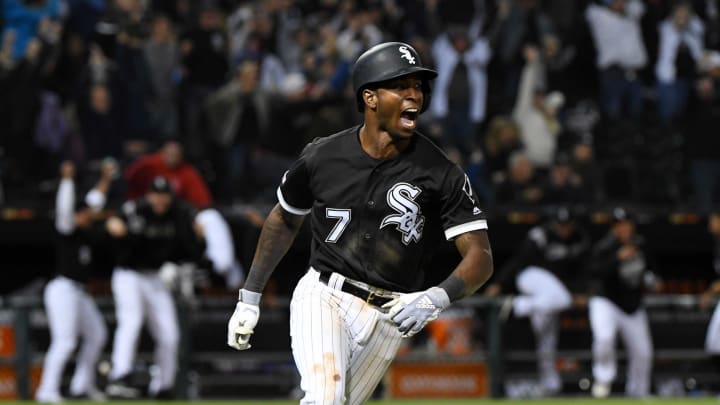Highlighting progressive voices in a conservative sport

“Baseball is a conservative sport,” my father, a conservative man, informed me at a time when I was much more interested in eating hot dogs and nachos than paying attention to what was happening on the diamond or within the Clinton Administration. “A smart person’s sport,” he continued.
I was eight years old, a mere little leaguer, when I first learned to associate baseball with politics, and the political landscape of baseball has not changed dramatically since I first started watching and actually paying attention to the sport in the mid-1990s.
Baseball is a conservative sport, abound with tradition and performative patriotism and steeped in a couple of centuries of whiteness at the expense of inclusion, and, unfortunately, its inability to break this mold may become its coffin.
According to TV by the Numbers and analysis by Derek Thompson of The Atlantic, the NBA has the youngest audience in pro sports; 45% of its viewership is younger than 35; this leaves a lot of potential for fans to grow with the sport. It also has the highest share of Black viewers — no other major professional sport comes close.
Even NASCAR has a diversity accolade: the highest share of women viewers.
And MLB fans’ demographic profile? It's 70% male 55% aged 55 and older — with only 24% of viewers being younger than 35. If baseball continues to fail to entice new fans from diverse backgrounds, it will not make the cut.
Fans of baseball know baseball has a marketing problem, and that marketing problem cannot be connected to one specific failure. The slow nature of play, the archaic blackout policies and regionalization that make the game inaccessible to most Americans, underpaying minor leaguers, administrative disputes, and the failure to promote players and make them stars on the national stage are all contributing factors.
Another contributing factor? The “unwritten rules” that make it difficult for players to be themselves. Displays of emotion, of confidence, of belief in the simple idea that Black Lives Matter, of not towing the right-of-center line are all interpreted as disrespecting the game — largely by the conservative, white male fan majority that the MLB has been hesitant to offend.
The people to whom baseball needs to market to keep this sport alive and well largely do not share these sentiments about “unwritten rules,” and to attract them MLB needs to showcase the progressive voices in baseball that many, but certainly not all, current fans would rather have “stick to sports.”
According to Pew Research Center, here are some facts about Gen Z and millennials – two demographics that are overwhelmingly choosing to support other sports over baseball:
- Gen Z and millennials are more likely than older generations to say that Blacks are treated less fairly than Whites in the United States today.
- They are also much more likely than older generations to approve of NFL players kneeling during the national anthem as a sign of protest.
- Majorities among the Gen Z and millennial generations say increasing racial and ethnic diversity in the U.S. is a good thing for society, while older generations are less convinced of this.
Below is a small sampling of player voices Major League Baseball should be elevating to grow the sport and draw in these potential fans; young people want to connect to players, to appreciate players on a personal level, and these players have spoken out on social issues regardless of the backlash they knew they were bound to receive in airing their sentiments. While most baseball players choose to stay silent on any topic that could be perceived as controversial, these players have chosen a more difficult path, but a path that might attract new fans who share their opinions.
And new baseball fans are good for all people who love baseball regardless of ideological alignment and political affiliation. That is what “stick-to-sports social media” is consistently failing to realize.
To thrive, baseball needs progressives. Baseball needs youth. Baseball needs diversity. Baseball needs a bigger fanbase. Excluding important voices will only hurt the sport moving forward.
Tim Anderson, Shortstop, Chicago White Sox
Anderson, the only African-American player on his South Side team, might be more familiar to casual fans for his early 2019 bat flip that proved the baseball faithful really hate fun than for his impressive 2019 batting title, but he is also making a name for himself as one of a few players willing to speak out extensively about social issues impacting his sport, including the Black Lives Matter movement and racial injustice.
In a New York Times article, he noted that the criticism of his now-famous bat flip led him to take on a more public persona. “‘I had no other choice," he said. "At that point people already labeled me. I had to open up and let people know who I am. Now I’m OK with being me. You’re either going to like me or you’re not, and either one is fine.”
Anderson has opted to have fun, and actually gives merit to the phrase “Let the Kids Play.”
Lucas Giolito, Pitcher, Chicago White Sox
Giolito, the self-proclaimed nerd-cool ace who scored a notable 30 on the ACT, admitted to the Chicago Sun-Times that he experiences trash-talking in the clubhouse due to his political opinions and notes that his worldview differs from those of most players. Giolito has spoken out regarding pro-immigration reform at the U.S.-Mexico border, was one of the first White players to support Black Lives Matter on social media, and even validated that he thinks Bernie Sanders is cool on a live stream.
Like his teammate, Anderson, Giolito is committed to supporting the community he plays in and using his platform to bring attention to the policies he supports.
.@ColorOfChange #BlackLivesMatter pic.twitter.com/CgMfsjoCOi
— Lucas Giolito (@LGio27) May 31, 2020
Sean Doolittle, Pitcher, Washington Nationals
The Washington Post noted in a 2018 article that Doolittle and his wife, Eireann Dolan, may be “baseball’s most woke couple.” While “woke” is often used as an insult to attempt to devalue a non-conservative opinion, Doolittle does not care about the shade.
Careful about the opinions he shares, ensuring they are always well-researched and carefully wrought, Doolittle is one of the strongest voices within “woke baseball Twitter,” and he and Eireann do more than just share words — they take action — including but not limited to supporting LGBTQ+ youth groups, combatting racial inequality through donations, supporting Syrian refugees, and helping military vets and their families secure housing through Operation Finally Home.
As a white person, racism isn’t something I’ll ever experience. We have a responsibility to listen to black people, to get educated, and use our white privilege to amplify the black community’s calls for justice. Here is a thread of resources we can use to become better allies
— Sean Doolittle (@whatwouldDOOdo) June 4, 2020
Amir Garrett, Pitcher, Cincinnati Reds
Garrett recently decided he is no longer going to sit back and stay silent on social injustice and poor national leadership; instead, he now uses his social media presence to highlight the importance of Black Lives Matter and the need to use masks as a safety precaution to protect others from COVID-19.
“As an athlete, we have a platform. We have a voice that a lot of others don’t. And at this time I will use my voice. I will use my platform in sports to bring awareness to what is wrong with our country. If I were to just sit back and continue to just ‘play’ I’d be a part of the problem. I want to be a part of the solution.”
I’m going to leave this here, and you guys take what you want from it. But I will continue to do what i feel is right. pic.twitter.com/cj5D5a4ux3
— CountOnAG (@Amir_Garrett) June 30, 2020
Jack Flaherty, Pitcher, St. Louis Cardinals
Flaherty, who identifies as Black and was adopted and raised by a single White mother, came out swinging in support of Black Lives Matter after the murder of George Floyd. In an interview with the Athletic, he even noted that keeping racial injustice at the forefront of baseball conversation was one of the reasons he opted to play the pandemic-ridden 2020 season.
In his firm four-part Twitter message, he strongly encouraged White allyship to combat injustice and inequality. “As for everyone else, especially those who have been able to reap the benefits of being born with white skin, help make a difference. Use your voice. Support Black-owned businesses. Educate yourself so that you can become aware of your own privileges you have had throughout your life.”
I CANT BREATHE pic.twitter.com/rfwtVFvTpN
— Jack Flaherty (@jflare_) June 1, 2020
Andrew McCutchen, Outfielder, Philadelphia Phillies
McCutchen is not new to conversations about racial and income inequality and their impact on baseball. His 2015 article for the Players’ Tribune highlighted the fact the road to play baseball competitively generally disqualifies talented children whose parents do not have the means to finance the expensive travel baseball circuit. “But all over the country, there are thousands of kids who are playing in a cornfield in Nebraska or a swampy field in Central Florida and they feel like nobody is watching. We need to find a better (and most definitely cheaper) way to give those kids a chance at a way out.”
While he does not consider himself an outspoken person, he stands up for what he believes, and thinks is right. Recently, he mentioned that the Yankees should eliminate their conservative hair policy, as it “takes away from our individualism as players and as people.” Even that slight criticism of the Yankees organization regarding a dated policy that would not even be formalized in writing in most of modern-day corporate America was met with fervent opposition.
A common theme among all these players is, “Sure, I could be quiet. I know the political context of the sport I play, but I have a voice, and I’m going to use it.” Diversity of thought leads to better results. Homogeneity of thought restricts progress and growth. This is true at a team level and an organizational level in all industries.
Baseball needs these voices. Baseball also needs the fans who are attracted to and inspired by these voices to help clear the sport’s murky future.
Conservative baseball fans — no need to worry — no one in baseball is advocating that the government control the means of production. No one is taking “God Bless America” from you on Sundays.
Just stop automatically dismissing the voices that are one of our best chances at securing a future for a sport we all love. Listen.
I condemn police brutality. #EndQualifiedImmunity https://t.co/kGDtZNbonT
— Andrew McCutchen (@TheCUTCH22) June 10, 2020
